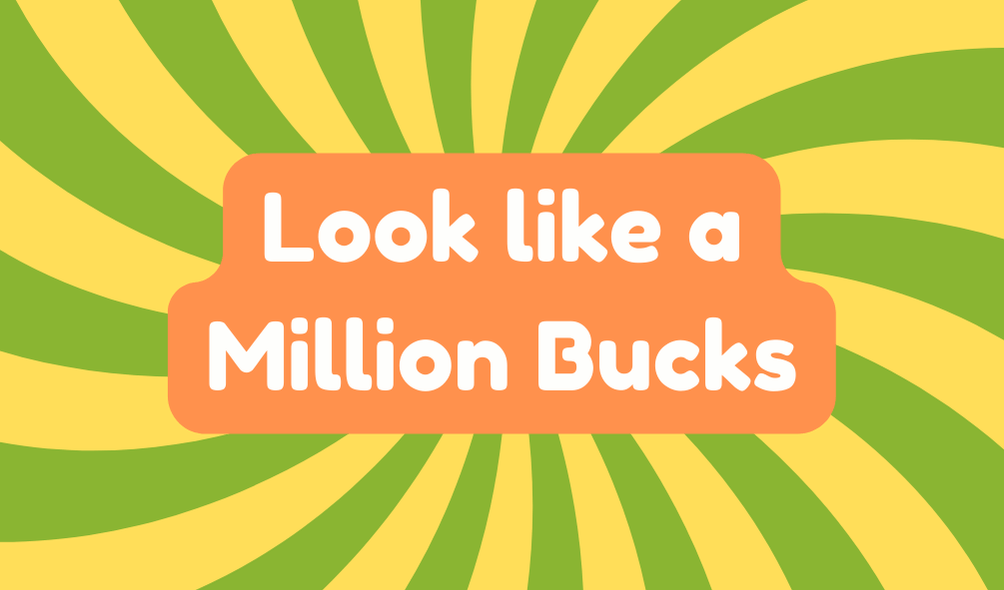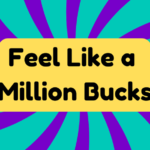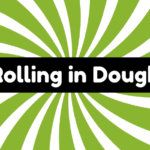Looking like a million bucks means presenting yourself with polished elegance that suggests wealth and sophistication. This phrase, rooted in early American culture, often evokes skepticism about our obsession with appearances. It highlights how a confident, well-coordinated outfit, regardless of cost, can communicate a luxurious aesthetic. Dressing to impress, accessorizing wisely, and embracing personal style are essential. However, it's important to question the superficial standards imposed by society and social media. While looking affluent may boost confidence, true elegance comes from within. To explore ways to enhance your own style, further insights are available.
Synonyms
When contemplating synonyms for the phrase "look like a million bucks," several expressions capture the essence of elegance and sophistication. These alternatives not only enhance our vocabulary but also shed light on comparisons in fashion, emphasizing the significance of presentation. Here are some compelling synonyms and expressions to contemplate:
- "Dressed to the nines"
- "Worth a fortune"
- "Polished appearance"
- "Refined elegance"
- "Fashionably fabulous"
Utilizing these expressions can elevate discussions surrounding personal style and self-presentation. However, it's crucial to remain realistic; although these terms suggest a striking appearance, they can inadvertently reinforce superficial societal pressures. Ultimately, understanding these synonyms expands our appreciation of fashion while also prompting reflection on the true value of self-image, beyond mere appearances.
Example of Sentences
Expanding on the previously discussed synonyms for "look like a million bucks," it is important to illustrate how this phrase can be effectively utilized in everyday language. This expression resonates deeply within the sphere of fashion statements and cultural perceptions, reflecting societal values that often equate appearance with success. Here are some contextual examples:
- "At the gala, she looked like a million bucks, effortlessly combining elegance and modern trends."
- "His new haircut and suit made him feel like a million dollars, showing the impact of grooming."
- "Walking into the office, her outfit announced she looked like a million bucks, exuding confidence."
- "Despite the budget constraints, he managed to look like a million bucks at the event."
- "The influencer's post reminded followers that looking like a million bucks is all about creativity, not just cost."
These examples highlight the phrase's versatile application in our daily lives.
Origin
The phrase "look like a million bucks" has its roots in the historical context of American frontier life, where the term 'bucks' originated from the use of buckskins as currency. This expression likely took shape during the early 1900s amid economic fluctuations, particularly the Roaring Twenties and the Great Depression. The notion of a million dollars symbolized immense wealth and luxury, reflecting significant economic implications. While the phrase embodies aspirations for prosperity and style, it also invites skepticism regarding society's fixation on outward appearances. Such priorities raise questions about authenticity in self-presentation. As we navigate contemporary definitions of success, it's crucial to reflect on whether looking affluent genuinely equates to true value or merely perpetuates superficial standards of worth.
Collocations
Collocations associated with the phrase "look like a million bucks" enhance its meaning and contextual use. By integrating these terms into our conversations, we can better capture the essence of style and self-confidence. Consider the following impactful collocations:
- Fashion trends that define elegance
- Dress to impress for significant occasions
- Radiate self-confidence effortlessly
- Accessorize wisely for maximum effect
- Embrace elegance in every aspect
These expressions serve not just as embellishments but also convey an underlying philosophy when discussing appearance. The prominence of fashion trends highlights society's inclination to equate self-image with success. However, one must remain critical; true confidence and personal worth extend beyond mere outward appearances, challenging the superficial standards often suggested by such phrases.
How to Use in Everyday Language
Incorporating the phrase "look like a million bucks" in everyday language can enhance conversations about style and confidence. This expression resonates particularly well in discussions about self-confidence and social perception. Utilizing it in casual exchanges can elevate the tone, creating a shared understanding of aesthetic appeal. For instance, complimenting someone on their appearance by saying they "look like a million bucks" acknowledges their effort while subtly reinforcing societal values tied to attractiveness. However, it is essential to be mindful of the underlying messages we convey through such language. Overemphasis on appearances can pressure individuals to conform to certain standards. In this way, while the phrase can foster positivity, it also invites critical reflection on the relationship between value and outward presentation.
Why Is It Still Relevant Today?
Why does the phrase "look like a million bucks" continue to resonate in modern society? Its relevance reflects deep-rooted cultural trends and the increasing focus on personal grooming. In an era where aesthetics can influence perception, the notion of looking polished transcends mere vanity; it embodies aspiration and success.
Here's a brief comparison of the phrase's cultural implications:
| Aspect | Modern Interpretation |
|---|---|
| Cultural Trends | Emphasis on influencer aesthetics |
| Personal Grooming | Routine or luxury investment |
| Social Media | Image-centric validation |
| Professional Image | Aligns with career advancement |
| Self-Expression | Reflects individual identity |
Thus, the phrase captures not only appearance but also the socio-economic layers influencing it.






